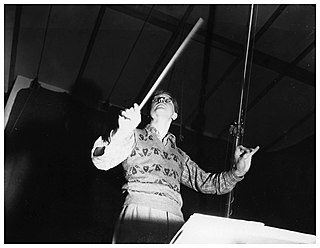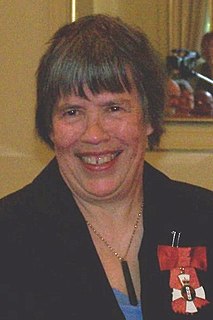Related Research Articles
Ragtime – also spelled rag-time or rag time – is a musical style that flourished from the 1890s to 1910s. Its cardinal trait is its syncopated or "ragged" rhythm. Ragtime was popularized during the early 20th century by composers such as Scott Joplin, James Scott and Joseph Lamb. Ragtime pieces are typically composed for and performed on piano, though the genre has been adapted for a variety of instruments and styles. "Maple Leaf Rag", "The Entertainer", "Fig Leaf Rag", "Frog Legs Rag", and "Sensation Rag" are among the most popular songs of the genre.

Douglas Gordon Lilburn was a New Zealand composer.

John Stanley Body was a New Zealand composer, ethnomusicologist, photographer, teacher, and arts producer. As a composer, his work comprised concert music, music theatre, electronic music, music for film and dance, and audio-visual gallery installations. A deep and long-standing interest in the music of non-Western cultures – particularly South-East Asian – influenced much of his composing work, particularly his technique of transcribing field recordings. As an organiser of musical events and projects, Body had a significant impact on the promotion of Asian music in New Zealand, as well as the promotion of New Zealand music within the country and abroad.

Dame Gillian Karawe Whitehead is a New Zealand composer. She is of Māori Ngāi Te Rangi descent. Her Māori heritage has been an important influence on her composing.

John Psathas, is a New Zealand composer. He has works in the repertoire of such high-profile musicians as Evelyn Glennie, Michael Houstoun, Michael Brecker, Joshua Redman and the New Juilliard Ensemble, and is one of New Zealand's most frequently performed composers. He has established an international profile and receives regular commissions from organisations in New Zealand and overseas.
Nigel Keay is a New Zealand composer. He has been a freelance musician since 1983 working as a composer, violist, and violin teacher. Nigel Keay has held the following composer residencies: Mozart Fellowship, University of Otago 1986 and 1987, Nelson School of Music 1988 and 89, Auckland Philharmonia Orchestra 1995.
Jennifer Helen McLeod is a New Zealand composer and former professor of music at Victoria University of Wellington.
David Blair Hamilton is a New Zealand composer and teacher.
Albert Ronald Tremain was a New Zealand composer and music teacher.
Andrew Perkins is a New Zealand composer, choral conductor and teacher. He has had a number of works recorded and performed internationally.
Juliet Palmer is a contemporary composer living in Toronto, Ontario, Canada

Dorothy Whitson Freed was a New Zealand author, composer, and music historian. She made significant contributions to the field of music librarians, and authored several books and articles regarding musical information and resources in New Zealand.
Eve de Castro-Robinson
The Juniper Passion is a 2011 opera by New Zealand composer Michael F. Williams to a libretto by John Davies. The opera is set in 1944 during the World War II Battle of Monte Cassino, an Allied victory, but with a loss of life totalling approximately 105,000 deaths, including many New Zealand soldiers, over the series of battles. The Juniper Passion is written in three acts, six principal roles and chorus and is scored for chamber orchestra with digital effects. Performance is through dance with only minimal movement and interaction by the singing cast. In place of traditional sets, the opera has a 3-D computer graphic set design by Sean Castle that recreates the Benedictine abbey at Cassino. This is interspersed with images taken during the battle by Richard Ferguson Davies, father of librettist John Davies.
Michael F. Williams is a composer of contemporary classical music. He has received commissions from many of New Zealand's major musical institutions such as the New Zealand Symphony Orchestra, NBR New Zealand Opera and Chamber Music New Zealand and his work is regularly broadcast on Radio New Zealand Concert. A lecturer in composition at the University of Waikato, Williams has received recognition in the NZSO-SOUNZ Readings on three occasions and in the SOUNZ Contemporary Award in 2012 for his multimedia World War II opera, The Juniper Passion.
Kenneth Young is a composer, conductor, radio presenter and lecturer in composition, conducting and orchestration at the New Zealand School of Music, Massey University and Victoria University of Wellington. As a composer, Young has had works commissioned by New Zealand and Australian orchestras and arts organisations including the New Zealand Symphony Orchestra, Auckland Philharmonia Orchestra, Tasmanian Symphony Orchestra New Zealand International Arts Festival and Chamber Music New Zealand. He works as a freelance composer and is fully represented by SOUNZ: The Centre for New Zealand Music. In 1976, Young became the principal tuba for the New Zealand Symphony Orchestra and first conducted the orchestra in 1985 becoming Conductor in Residence in 1993. In 2001, he resigned from the orchestra to become a full-time conductor, composer and recording artist for orchestras in New Zealand and Australia, as well as engagements in Japan and the United Kingdom. He is well known for his interpretation of Romantic, 20th Century, New Zealand and Australian orchestral repertoire and in 2012 conducted both the winning album, Angel at Ahipara and finalist album, Releasing the Angel, for Best Classical Album at the New Zealand Music Awards. Young has been recorded by EMI, Atoll Records, Continuum, Trust Records, ABC Classics and Naxos and is a frequent presenter on RESOUND, Radio New Zealand Concert introducing and contextualising work from the RNZ archives. In 2004 was awarded the Lilburn Trust Citation in Recognition of Outstanding Services to New Zealand Music.
"Symphony No. 1 in 20 Keys " is a five-movement polytonal symphony for large orchestra written in 2014 by Matthew de Lacey Davidson. Its total duration is approximately 35 minutes.
Salina Fisher is a New Zealand composer and violinist currently based in Wellington.
Donald Ashwander (1929–1994) was an American composer in the contemporary ragtime movement. Much of his printed music was not available to the general public until 1996, two years after his death.
References
- ↑ ...as the magician misdirects... "writer Biography". July, 2017.
- ↑ Canadian Music Centre. "Composer Biography". February, 2013.
- ↑ Interview in The Reading Nook. "Interview with Matthew de Lacey Davidson". April, 2018.
- ↑ Matthew Davidson, "Composer Biography", SOUNZ, Centre for New Zealand Music (January 2013). Retrieved 17 February 2013.
- ↑ Couture, François "Review", Stolen Music. Retrieved on July 11, 2012.
- ↑ Goodreads "Matthew de Lacey Davidson, Goodreads Author". Retrieved on April 22, 2018.
- ↑ The Bookbag "Jill Murphy, The Bookbag, review of Roses in December". Retrieved on April 22, 2018.
- ↑ The Bookbag "Jill Murphy, The Bookbag, review of PRECEPT". Retrieved on April 22, 2018.
- ↑ "Matthew Davidson, article regarding creation of the novel, PRECEPT". Retrieved on April 22, 2018.
- ↑ "Author Interview, Debra’s Book Café". Retrieved on April 22, 2018.
- ↑ American Composers Association "Composer Biography". Retrieved on July 11, 2012.
- ↑ American Composers Association "Composer Biography". Retrieved on July 11, 2012.